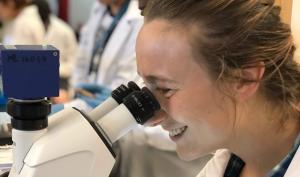
Two years ago, Beverly Miller founded the advocacy group Women in Chemical Engineering at the University of Virginia. It is the second chapter in the United States and the only one on the East Coast.
Now, Miller is once again breaking new ground, this time with research in Steven R. Caliari’s lab, where she has worked since arriving at UVA’s School of Engineering as a Ph.D. student in 2017. Caliari, an assistant professor of chemical engineering with a secondary appointment in biomedical engineering, develops biomaterials to study disease progression and to engineer new tissues.
Miller, who earned her B.S. in bioengineering at Oregon State University, has focused primarily on engineering new biomaterials for skeletal muscle repair. But she has always been interested in reproductive biology.
“Particularly when it comes to women’s reproductive rights, men’s options for family planning, and — at a cellular and more biologically driven level — the amazing process of fetal growth,” Miller said.
That’s how the past spring found her at the University of Chicago’s Marine Biological Laboratory in Woods Hole, Mass. She went there for Frontiers in Reproduction, an intensive workshop designed to improve skills and knowledge in experimental reproductive biology. In a tight-knit residential environment, students were immersed in lectures, discussions, informal seminars, laboratory exercises, demonstrations and one-on-one tutorials.
Rediscovering the Way
Miller plans to use that experience and her training at UVA to help people whose reproductive organs have been impaired by disease or injury. She sees the path she is on now as the one she was always meant to travel. The turning point was attending a guest seminar last fall on approaches to treating ovarian cancer, where she first heard about Frontiers in Reproduction.
She discovered that UVA professor of cell biology Barry T. Hinton teaches one of the workshop’s three two-week sections, and she arranged to meet with him to learn more about his work. Miller had begun to realize that her interest in human reproduction was still there — it had just become lost in her engineering pursuits. Suddenly, she saw the two as a promising match and Frontiers in Reproduction as a means to bring them together.
“The workshop was a great opportunity to network with scientists in the reproductive biology space, so I could learn standard research techniques in the field, which fall outside of my engineering training,” Miller said. “I also was interested because there are very few engineers working in this space. I see an opportunity to grow research in this area, which requires in-depth knowledge of the field.”
As she lays the groundwork for her dissertation proposal, she is looking at how to apply tissue engineering approaches for the skeletal muscles to the muscular organs of the female reproductive system, including the uterus, ovaries and pelvic floor muscles. As part of her research, she plans to observe UVA surgeons perform hysterectomies or procedures to treat endometriosis to better understand reproductive anatomy and how surgical techniques are used.
“I hope to take the knowledge I am learning related to muscle tissue and apply it to reproductive biology,” Miller said. “There are many strategies that we can harness from one tissue type to another, with some tweaks in terms of base material properties.”
While it’s hard to know exactly where her Ph.D. research will go, Miller is exploring tissue engineering using hydrogels designed for the ovarian microenvironment or other reproductive organs for applications such as reconstruction following cancer treatments. Hydrogels are crosslinked networks of polymer chains — a polymer being a large molecule made of repeating subunits. Hydrogels can absorb large amounts of water without dissolving, like many tissues in our bodies, resulting in properties that make them useful in myriad biological applications. Soft contact lenses are hydrogels, for example.
